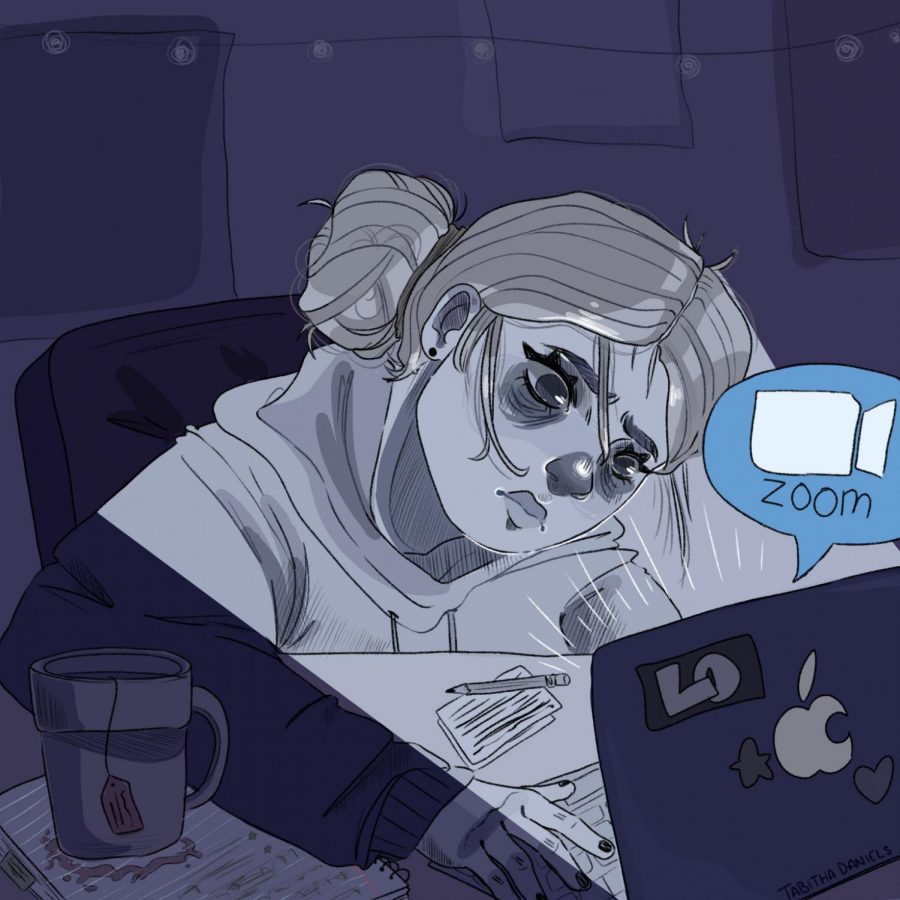Online school finds another way to haunt us: zoom fatigue
November 20, 2020
Coronavirus took the world by storm, and in response, many schools and workplaces shifted to an online dynamic. Workers and students experiencing this new shift are also facing what is called “Zoom Fatigue.” The symptoms of this new found illness can include, screen fatigue, eye strain, burnouts, exhaustion and anxiety. So why is video chatting so much harder than in-person work?
In “The Neuropsychological Exploration of Zoom Fatigue,” The Psychiatric Times describes how when on a video call, you are required to focus more than during a face to face conversation. Students and employees have to take more time to process simple social cues due to the fact they are receiving them over a screen. It takes much more effort to recognize body language, a person’s tone when speaking, facial expressions and even just when it is the right time to add to a conversation. Not only are your brain’s dopamine rewards decreased, they are almost out-weighed by the cognitive effort required for your brain to decipher and participate in conversations. For these reasons many students and employees are finding it harder to engage in adaptive responses and reciprocate effective communication.
It can be harder than ever to focus during a video call. I know we can all admit that we have probably checked our phone more than once during a Zoom class. Maybe it’s your family members’ discussion outside of your bedroom door or the lawnmower outside is a bit too obnoxious, either way students are finding it challenging to focus. Some find it difficult to create a completely private workspace while working from home. Additionally, having to work in the same space without much variety is the opposite of engaging. “In school I feel far more productive.” said sophomore Nandita Kumar. Some students and employees have even begun to feel that every day is monotonous.
Constant screen usage can also lead to prominent physical irritation as well. Increased screen time has become a trait of this new era of at home learning. One of the effects of this is asthenopia, or eye strain. This eye condition manifests through symptoms such as fatigue, pain around the eyes, headaches and much more. This new condition is called screen fatigue, caused when your eyes get exhausted from intense use for extended periods of time.
Sophomore Claire Tansey said, “I have felt the negative effects of being on Zoom for five hours and then having an additional 2 to 3 hours for homework. My eyes burn and hurt and I can’t keep my eyes open at the end of the day.”
Additionally, junior Stephanie Ray said, “Zoom makes it really hard for me to be on top of my homework. I’m so tired from staring at the screen all day that I end up taking a really long break… because my eyes are tired.”
Many students and employees are encouraged to process information presented through a screen, their eyes not leaving their screen for hours. According to the University of Iowa Hospitals and Clinics, a person blinks up to 66 percent less frequently while using a computer. Blinking and having hydrated eyes is crucial to preventing red, dry, tired eyes.
So what are some proactive steps you can take to prevent zoom/screen fatigue while working from home?
- Hydrate: Drinking water may be one of the most common solutions offered to any problem, but, proper hydration can greatly reduce eye strain and overall make sure your body is ready for your tasks. Try to create a habit of regularly drinking water while using screens. Hydrating your body can reduce itchiness, irritation and eye strain.
- The 20-20-20 Rule: Every 20 minutes take the time to look at an object at least 20 feet away for 20 seconds. Remember to give your eyes a break, they need it! If you have trouble remembering you can set alarms on your phone to remind yourself to get up, stretch and rest your eyes on something new.
- Limit Screen Time: As students, we are already spending hours upon end on our computers and phones. Try to limit your screen use to only what is necessary for your school work and personal enjoyment. Tennagers’ brains and bodies are still developing, try to reduce how much screen time you subject to your growing body.
- Breaks! Breaks! Breaks! It’s okay to allow yourself to have a few breaks here and there. Try to create or use your schedule’s built in breaks to your advantage. Take some time to rest so your scheduled work time can be used to create your best work. Remember that self care isn’t something you should feel guilty about, in fact it’s productive. It’s completely okay to feel drained, you aren’t alone.
- Take Care of Your Body: You can’t do great work without taking care of yourself first! Make sure you are exercising regularly, getting enough sleep and eating lots of nutritious foods. Exhaustion and stress can amplify the effects of screen fatigue and burnouts.
- Your Environment: Make sure you sit about an arm’s length away from your screen. Additionally, make sure you position your screen so you gaze downwards. Aim to put yourself in a space that can allow you to be productive and work towards your goals. Try to separate your “work” space and your “relaxation” space, your brain will begin to associate certain places with certain tasks, helping you be more productive.


